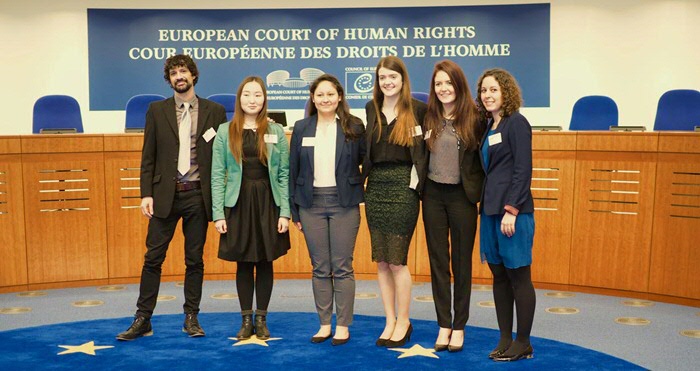Fourth place out of 95 universities in ELSA European Human Rights MOOT Court Competition
Between 13 and 16 February 2017, a team of LLM students from the Faculty of Law, University of Groningen participated in the final rounds of the fifth annual ELSA European Human Rights Moot Court Competition.
The Groningen team was selected from among 95 universities after presenting written submissions for a fictitious case involving a ticking bomb scenario, the prohibition of torture and inhuman or degrading treatment, and the right to privacy among others.
In the final oral rounds, the Groningen team faced twenty other finalists where they had to orally plead their case before real judges and representatives of the European Court of Human Rights. The Groningen team managed to end up in the fourth place, after losing the semi-finals against a team from the Ukraine that in the end won the competition.
Fourth place out of 95 universities is an excellent result and demonstrates the quality and hard work of the team, and the capacity of the coaches to run a successful moot court team that places Groningen and the Faculty of Law on the (legal educational) map! The team is composed of Meaghan Beyer, Aitlina Petrova, Sophie McGlacken, and Amy Taylor, and coached by Dr Panos Merkouris and Dr Antenor Hallo de Wolf, assisted by Lottie Lane (LLM).

| Last modified: | 18 January 2024 1.52 p.m. |
More news
-
22 April 2025
Impact | Online advice about right to freedom of assembly
In the coming weeks the nominees for the Ben Feringa Impact Award 2025 will introduce themselves and their impactful research or project. This week: Noor Swart and Berend Roorda, on their online information initiative on the right of freedom to...
-
22 April 2025
How do you shield yourself from Big Tech's power?
How can we all become less dependent on Big Tech? A topical and urgent question that is also arising within the University. Recently, a petition by a group of staff members made the rounds that called for the University to break away from Google and...
-
15 April 2025
The Faculty of Law launches podcast The Right to News
On 16 April 2025, the Faculty of Law at the University of Groningen will launch the first episode of its podcast The Right to News (in Dutch: Recht op Nieuws). The theme of the first episode is: “Can the government just ban organizations in the...
